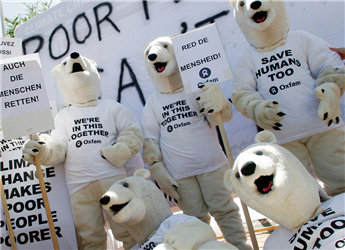Last Chance - Waht, Another One? - To Stop Global Warming
IBDEditorials.com

Environmental activists dressed as polar bears demonstrate outside the United Nations Climate Conference in Nusa Dua, Bali, Indonesia, on Dec. 14, 2007. AP.
Weather: Activists are warning that the upcoming
United Nations climate conference is the last chance
to save the world. Fair enough. So if no deal is
reached at the meeting, can we please stop hearing
about global warming?
The 21st session of the Conference of Parties to the
U.N.'s Framework Convention on Climate Change starts
Nov. 30 and will ponderously drag on until Dec. 11.
Call it the "Last Chance in Paris," because that's
what the fearmongers, from the
Vatican to Prince
Charles, believe it is.
Of course we've heard all this before.
It seems as if every time there's a U.N. climate
conference, we hear the warnings: It's the final
opportunity to save Earth, the "last chance."
Consider these caveats:
• In 2001, Time magazine said the U.N.'s Bonn
conference was "a global warming treaty's last
chance."
• Four years later, activist Mark Lynas wrote in an
open letter that the Montreal climate summit
represented "a last chance for action."
• Before the 2007 meeting in Bali, Tony Juniper of
Friends of the Earth declared that the conference
"could be the last chance to avoid the worst effect
of global warming."
• Australian environmental scientist Tim Flannery
said in 2008 that the Poland "round of negotiations
is likely to be our last chance as a species to deal
with the problem."
• Then before Copenhagen in 2009, European Union
Environment Commissioner Stavros Dimas said that
conference was "the world's last chance to stop
climate change before it passes the point of no
return."
We could go on. The warnings have continued every
year since without fail. So it's unlikely we've
heard the last of the "last chance" warnings, even
if no agreement is reached in Paris.
But we should have.
There's a growing stack of evidence that contradicts
the alarmists' warnings and refutes the scientific
"consensus" that man is overheating his planet with
carbon-dioxide emissions.
Start with NASA's recent finding that Antarctica is
actually gaining ice, not losing it, and the fact
that the North Pole has not been ice-free in any
summer although climate extremist Al Gore claimed it
would be by now.
Then move on to the global warming models used to
predict climate calamity. They have been about as
accurate as wild guesses.
Why has this happened? Maybe because, as Australian
electrical engineer David Evans discovered through
mathematical calculation, CO2
is not as strong of a greenhouse gas as the U.N.
says it is.
Evans found that it's about "a fifth or 10th" of
what activists claim it is, having "caused less than
20% of global warming in the last few decades."
Related to the flawed models is the measured reality
that Earth
hasn't warmed in 16 to 18 years.
Other events and circumstances that hurt the warming
narrative include: doctored data used by alarmists;
admissions by former activists that they either
overestimated temperature increases or were simply
altogether wrong; and the work of credible
scientists that goes hard against the warming
claims.
None of these counter-examples will move the
activists from their position. They will continue to
agitate for government-enforced limits on CO2
emissions and lecture us about how we live.
Their last chance should have come long ago, but now
it looks as if they will never run out of them.

